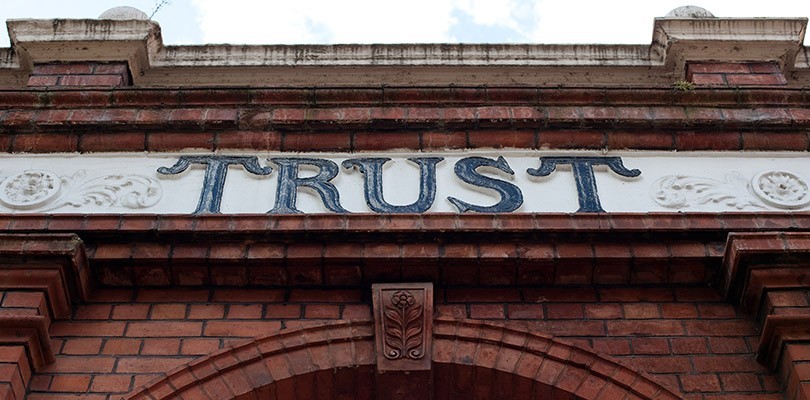We Asked 11 Sales Influencers about How to Build Trust in the Sales Process. Their Responses May Surprise You
Editor's Note: As 2020 approaches, we're looking back at some of 2019's most popular posts on the LinkedIn Sales Blog. This one ranked No. 12.
The LinkedIn State of Sales report confirms that the trust factor is a key to closing deals. In the most recent report, sales professionals in the United States rank trust as the No. 1 factor in closing deals (40 percent) — above ROI and price. More important, 51% percent of decision makers rank trust as the top factor they desire in a salesperson.
Other findings in the State of Sales report indicate that professional and social networks are helping sales professionals better understand buyers’ needs and establish trust early on. For instance, 62 percent of decision makers look for an informative LinkedIn profile when deciding whether to work with a sales professional
To gain further insight into how trust impacts the buyer’s journey, we asked a cross-section of sales industry experts this question: “What are some critical ways that a salesperson can establish trust with prospects?”
Read on for their insightful answers...
"You can’t outsource trust. Humans beings are literally wired to build trust with each other —that’s why we have big brains! Salespeople need to focus on building the human-to-human relationship with prospects and customers before asking for business. Although it’s important to meet your audience across a variety of different channels and media, if you hide behind digital communication it will be much harder. Getting face-to-face with someone, whether in person or video will be increasingly important. Ironically, as technology’s presence increases, our desire for human engagement also increases. The smart salesperson will leverage our interpersonal capacities to build trust and find success." — David J.P. Fisher, President, RockStar Consulting
One of the very best ways to establish trust with a buyer is to be referred to them through someone the buyer trusts — especially if outside of the their organization. The challenge for many sellers is that they don't develop a process to connect with strategic referrers who could make these great introductions on an ongoing basis. Otherwise to build trust without being referred in, be credible, authentic, and share stories on ways you've solved issues similar to those you are proposing to your buyer to solve. — Lori Richardson, CEO, Score More Sales/President, Women Sales Pros
"There are 4 key elements or trust:
- Capability — are you good at what you do? Can I trust you with the work output?
- Dependability — will you show up and meet your commitments? Can I trust you will do what you say?
- Integrity — do you have virtue of purpose? Can I trust you will do the right thing by me even when it might be in your self-interest not to?
- Intimacy — how well do I know you? Can I trust the strength and depth of our relationship?
To this last point, just getting to know someone builds trust. The RAIN Group Center for Sales Research conducted a survey and asked how many people in general were trustworthy. The most common response was 30 percent. Of the people you know, how many are trustworthy? The answer more than doubled to 70 percent. Intimacy is getting to know people well. Do that and you’ll build trust. However, they all work together. There are people I know well and deep relationships with (I ‘trust’ the strength of our relationship), and they have high integrity (they’ll do the right thing) and they are good at their work (they’re capable) but they don’t meet their commitments and never show up on time (they aren’t dependable). So, I trust them in some ways and not others. — Mike Schultz, President, RAIN Group
"It’s all about research and preparation. Sellers need to know their buyers’ industries as well, if not better, than the buyers themselves. That comes down to taking the time to research. Read the company’s press releases. Study them on social media. Take a deep dive into their website messaging, and what analysts are saying about them. If you don’t enter a sales pursuit with a deep understanding of the business problem and the ability to prove that you can solve it — you will lose a lot more than you will win.It ultimately comes down to confidence: Modern sellers must always prove they understand the business problem, prove that they have solved it for other buyers and prove that if the prospect makes an investment they will get a hard ROI. Research, preparation, and focus helps instill that confidence, which in turn instills trust in the buyer." — Ed Calnan, Founder-President, Seismic
I think the easiest way to establish trust is to align the natural strengths of the seller with the buyer’s conversation, and to enable this with tools to get the message out. Far too often sales leaders do not hire with this in mind. They think in terms of skills rather than alignment of the marketplace. This is important for trust. Salespeople can capitalize on their strengths in simple ways. By doing what they say by when they say it will be done. By being able to deliver the resources of their firm in ways that matter to the client. And by anticipating obstacles that may arise before the customer encounters them. — Tracey Wik, President, GrowthPlay
"Adding value outside of the sales process is the number one way. Help people. Genuinely care about them, and show it. If you are a tech company, provide cybersecurity advice, or provide free tech to help for your customers for example. If you are in finance, provide helpful banking advice, for example, around saving, compound interest, free webinars and tools. Steady streams of this kind of content and tech will set certain companies apart from others, and it’s already happening. At the end of the day, you don’t want to be a sale rep, you want to be someone’s trusted business partner — their buddy. Because when they need something (or have assets under management to invest), they are not going to call a sales rep, they’re going to call their buddy, whom they trust. And help in the community! Not because you want the PR, but because you genuinely want to help people. It goes a long way to building trust as well." — Robert Knop, CEO, Assist You Today
Trust is the X-factor in sales as it accelerates client time-frames and increases commitment. Salespeople can best build trust by showing they undertsand the buyer and that they have shared values. Value and trust go hand-in-hand for sales success. To rapidly built trust, every seller should provide value in a conversation before seeking to position the value of what they sell. They can do this by focusing on doing research and showing insight in a ‘point-of-view’ highly relevant to the customer’s business results. This then earns the right to ask the right questions to then truly listen, take notes, and use relevant stories and examples. They should also display shared values of professionalism in respecting time, having an agenda, focusing on the customer’s business case, tangible results, managing risks, securing consensus, achieving the customer’s KPIs. The way we engage the buyer, by providing value and building trust, is the strongest way to differentiate and increase the probability of success. Lead with 'them and their outcomes', rather than 'you and your solutions'. — Tony Hughes, Managing Director, RSVPselling
"Salespeople should be sharing valuable content/insights driven by business acumen. They should understand the ecosystem that their product/service operates in and be willing to refer the prospects outside their own company to increase the value of the total solution." — Kurt Shaver, Chief Sales Officer, Vengreso
"Talk about yourself last. Prioritize the customer’s story first. Literally wait as long into the sales process and conversation as possible to talk about your product and services. Establish and ground the buying journey on the customer’s needs, pain and objectives. Recognize and respect that the buying journey trumps your sales process." — Matt Heinz, President, Heinz Marketing
Do your homework, the buyer is generally more informed than you give them credit for. Listen, learn and earn the right sell. Start having conversations and stop giving presentations. — Roderick Jefferson, CEO, Roderick Jefferson & Associates
"Trust is built when a buyer believes that the sales rep is interested in the buyer’s best interest. The challenge is, how does a sales rep demonstrate that to a buyer? There are a couple of key things that must take place:
- Show the buyer that you know them. Tailoring communication and researching the buyer is critical to communicate effectively and demonstrate your knowledge of the potential buyer.
- Listen! So many sales reps are so busy talking, or waiting to talk, that they don’t actually listen to understand.
- Add value. Don’t waste your prospect’s time with your agenda. Make sure you add value to their time and meet and exceed their expectations." — Julie Thomas, President-CEO, ValueSelling Associates
For more insight into trust’s crucial role in the sales process, download the State of Sales Report today.
Photo: Lars Plougmann
Topics: B2B sales strategies and trends
Related articles




